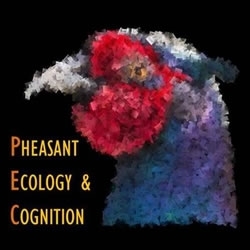Joint project between the GWCT and the University of Exeter

The GWCT, the University of Exeter (Pheasant Ecology and Cognition team), and Sutton Court Game Farm are currently researching whether relatively cheap changes to diet and pen structure during pheasant rearing can impact positively on the bird’s capacity to survive once released.
If successful, it is hoped that this methodology could be adopted by game breeders, allowing for lower release numbers whilst maintaining the same game bag. Consequently, this will reduce many of the impacts pheasant releases can have on the surrounding environment whilst simultaneously reducing shoot costs and maintaining the positive land management aspects of shooting.
Our methods will require little if any changes to current shooting practices, either in land or pheasant management, allowing for its introduction with minimal difficulty.
Shoots which participate in this work receive their usual stock of pheasants, with half the birds having been reared under normal industry conditions and the other half having been reared under enhanced conditions. Our pilot work showed that birds reared under these enhanced conditions were less likely to die before, during, or after the shooting season.
We hope that this will allow participating shoots to achieve higher bag counts without incurring any additional costs, as all addition expenditure for raising the enhanced birds is covered by the Game and Wildlife Conservation Trust.
Objectives
- Working with Sutton Court Game Farm, we will be breeding two groups of birds:
- Control: birds raised under normal commercial conditions.
- Enhanced: birds raised with an altered diet (added mixed birds seed and live mealworms) and added perching opportunities provided in rearing pens.
- Tag the birds to identify their rearing conditions.
- Release both groups of birds at shoots as normal in equal proportions.
- Record the number of tagged birds in the game bag and compare the relative percentages, identifying if enhanced birds are surviving at a higher rate than control.
- Repeat this for at least another shooting season, enabling the measurement of bird numbers that survived in the wild from the initial release.
Evidence for benefits in diet and pen structure
- The idea behind both changes is to produce a more natural environment in which the birds are raised, and thus improve their capacity to survive in the wild. In our opinion, one of the primary causes for such high pheasant mortality rates post release is a lack of natural behaviours and morphologies caused by some of the practical limitations of the current breeding system. Two separate pieces of research, published in peer-reviewed scientific journals, carried out by Dr Mark Whiteside and Dr Joah Madden at the University of Exeter into diet complexity and the provisioning of perching material in the rearing environment have revealed positive benefits for pheasant fitness.
- Benefits for birds reared with an enhanced diet :
- Forage for less time and have a higher likelihood of performing vigilance behaviour, thus reduce their risk of predation.
- Better at handling and discriminating natural food items.
- Develop a more natural gut morphology.
- Are less likely to die of natural causes during and after the shooting season.
- Benefits for birds provided with perching opportunities early in life:
- Improved morphology, being heavier and having larger leg bones at release, enabling them to roost more effectively.
- A higher propensity to roost off the ground at night, reducing their risk of predation.
- A more accurate spatial memory, enabling birds to deal with the wild environment more effectively.
- A lower likelihood of dying of natural causes prior to the shooting season.
Conclusion
The Enhanced Bird Project aims to improve pheasant survival in the most cost-effective way, in a manner that changes current pheasant management practices as little as possible, and using a method that can be easily adapted to our current pheasant breeding systems. We believe we can achieve significant benefits from the small changes we have outlined above, thus improving the environmental, sustainability, and monetary condition of shooting in the UK.
If you have any questions or would like access to any of the research carried out by Mark Whiteside, please contact Andy Hall at ah633@exeter.ac.uk.